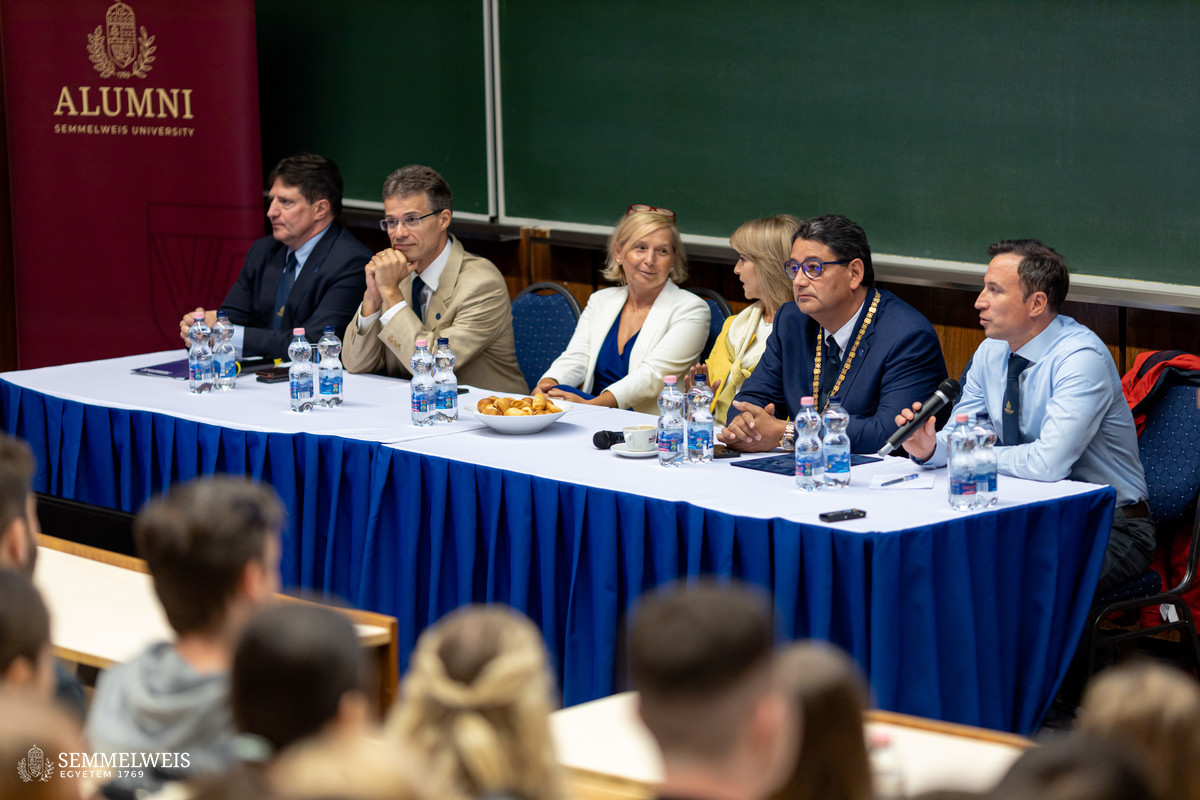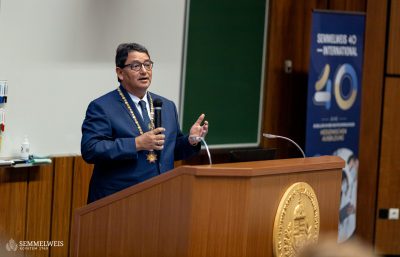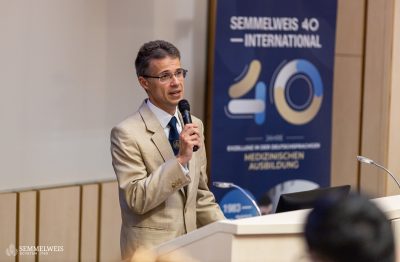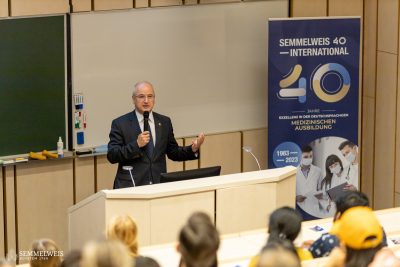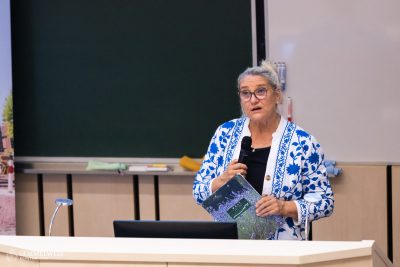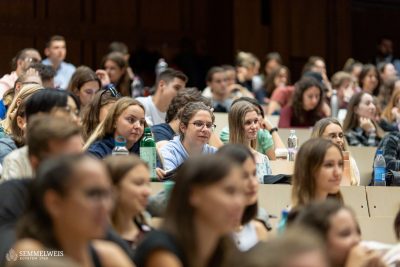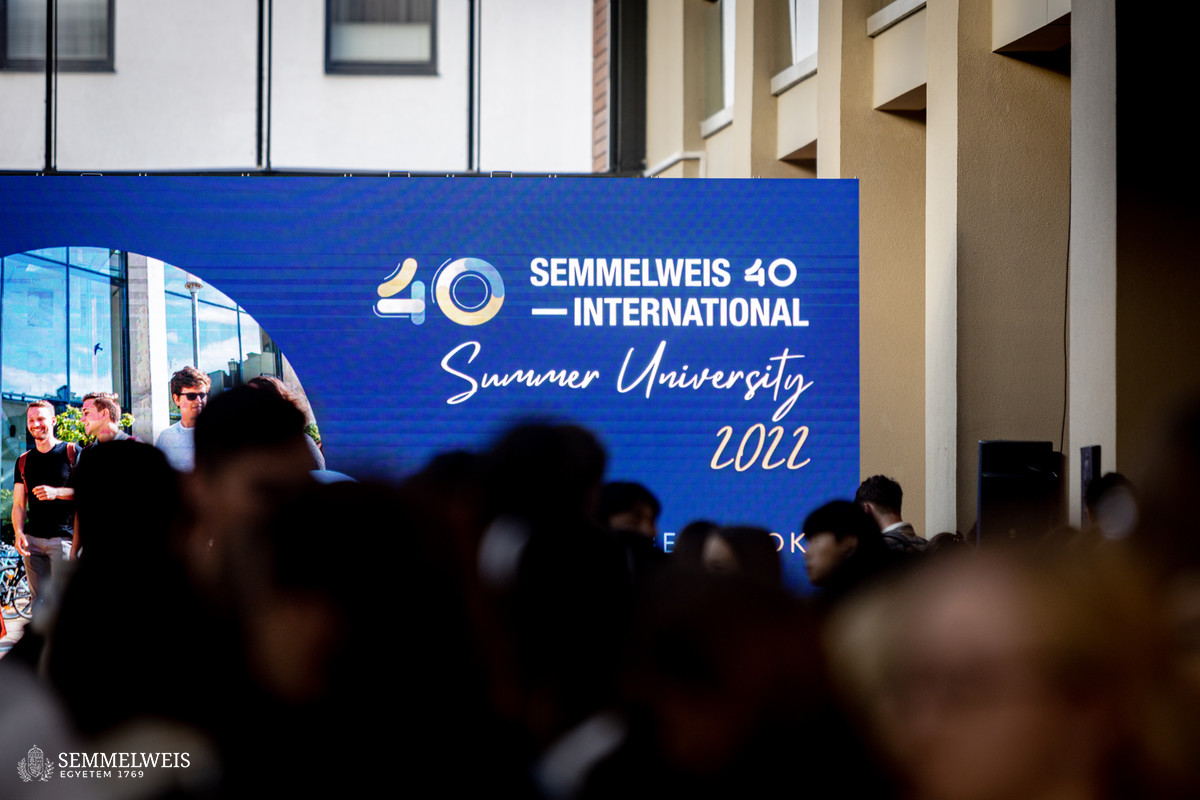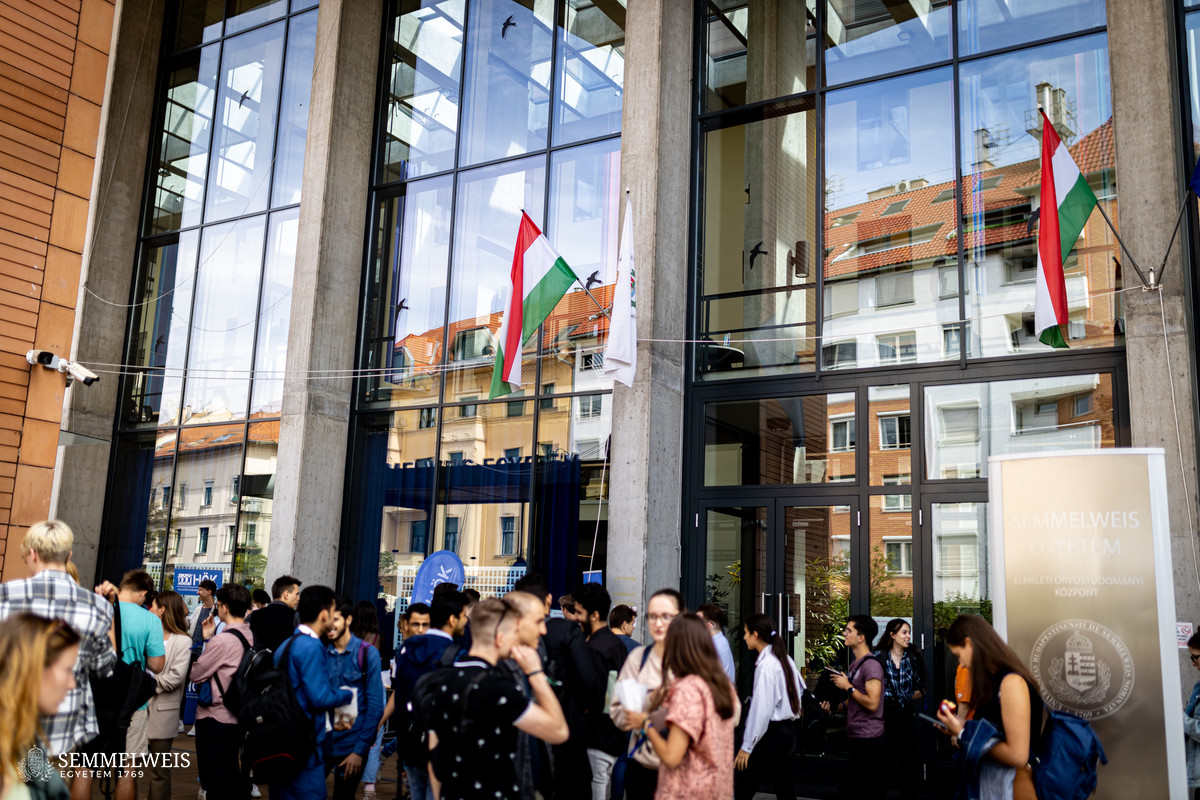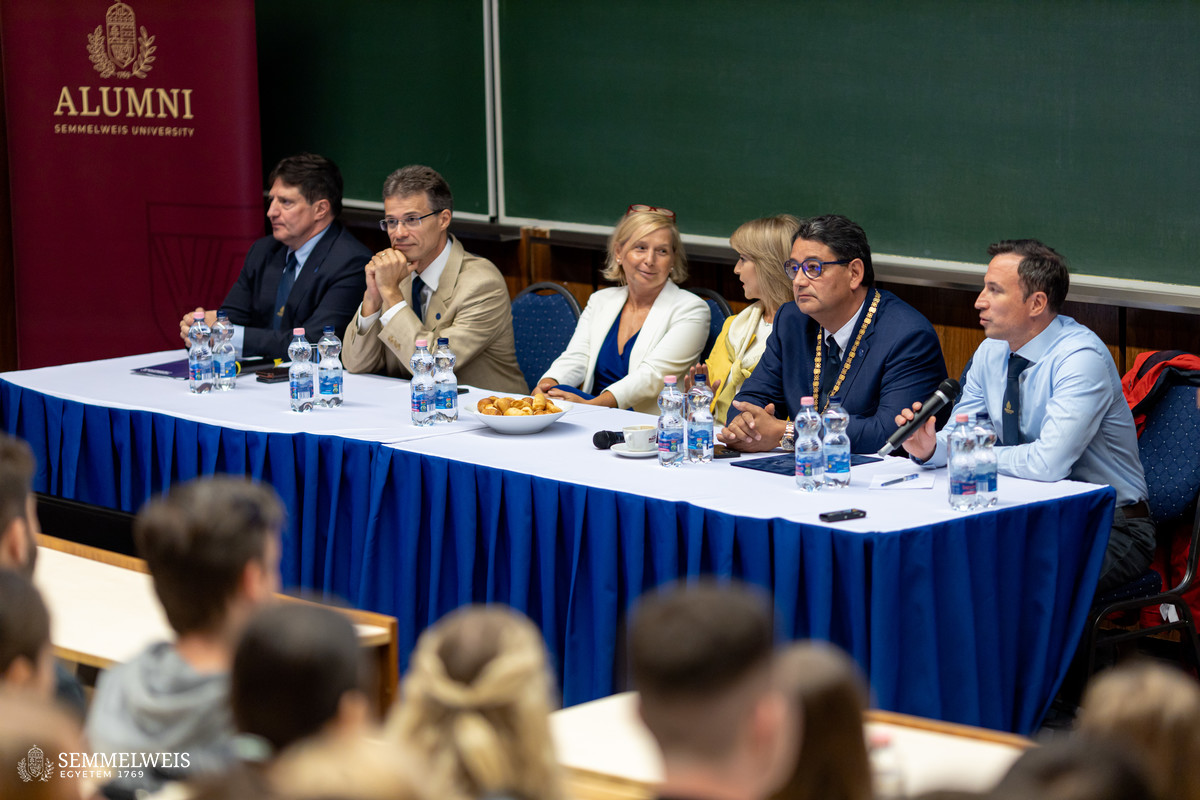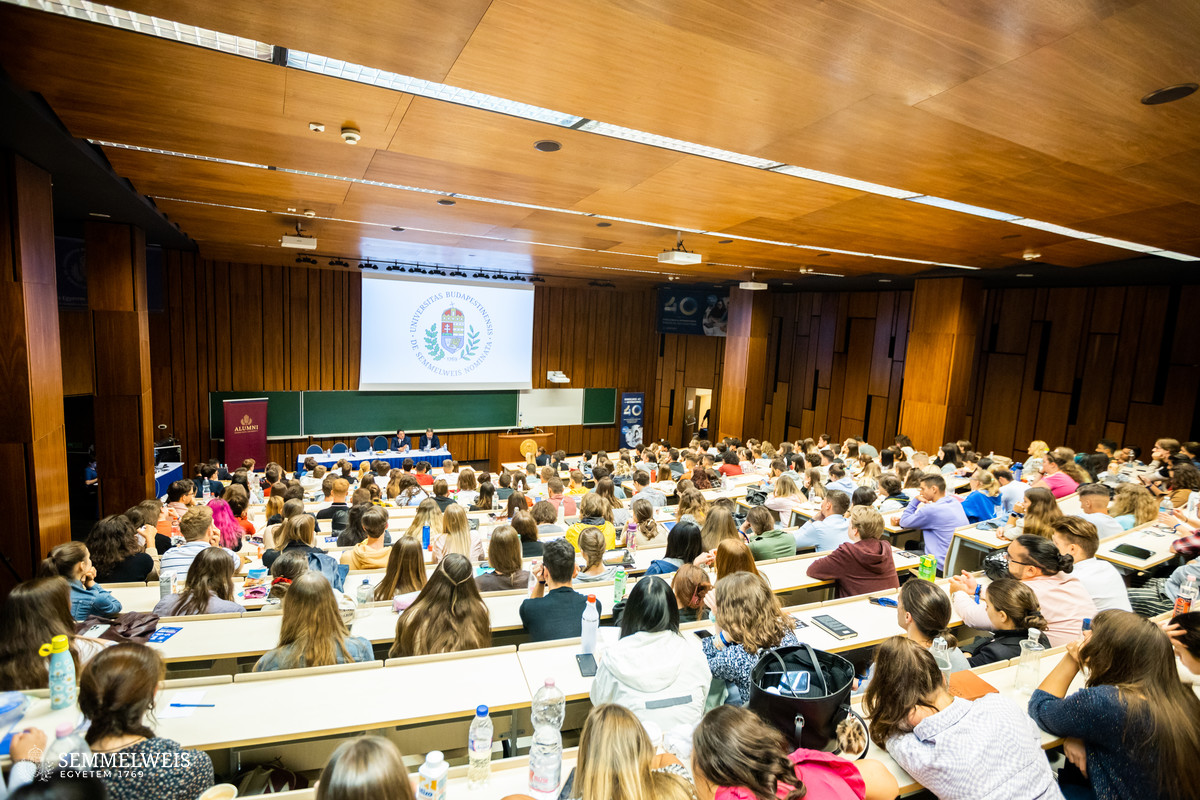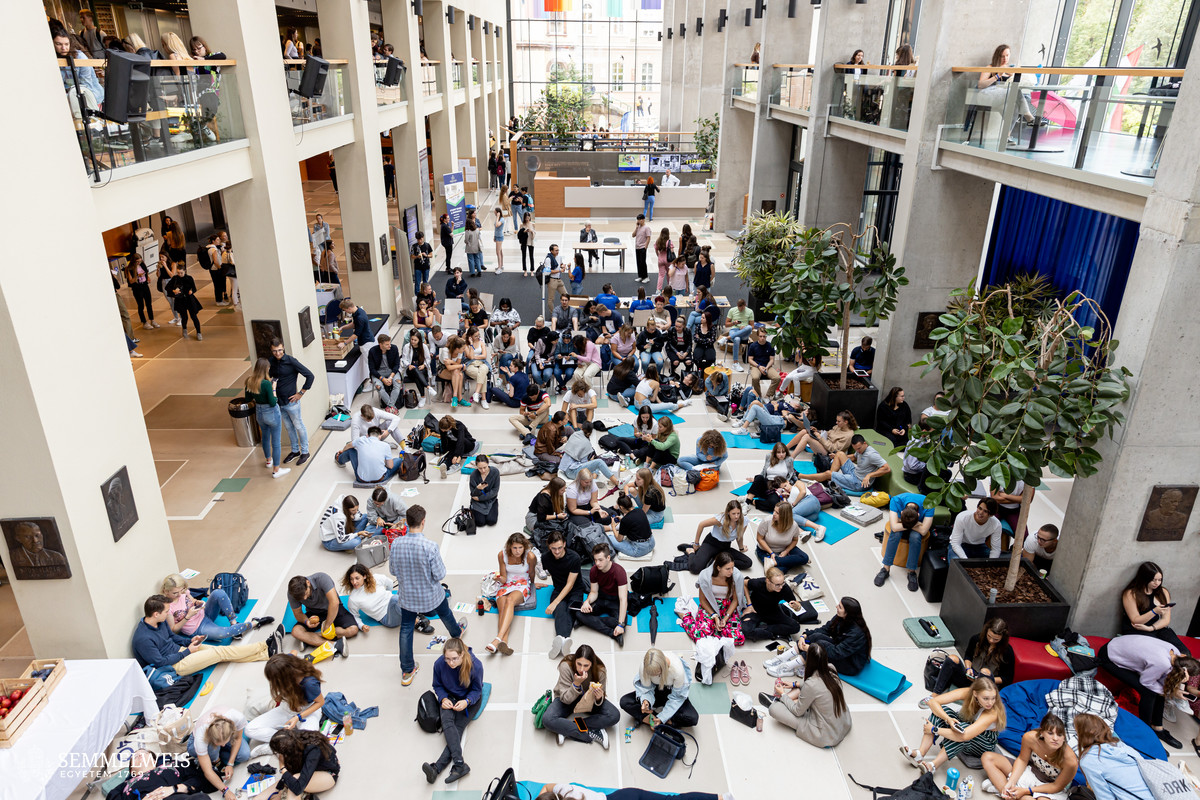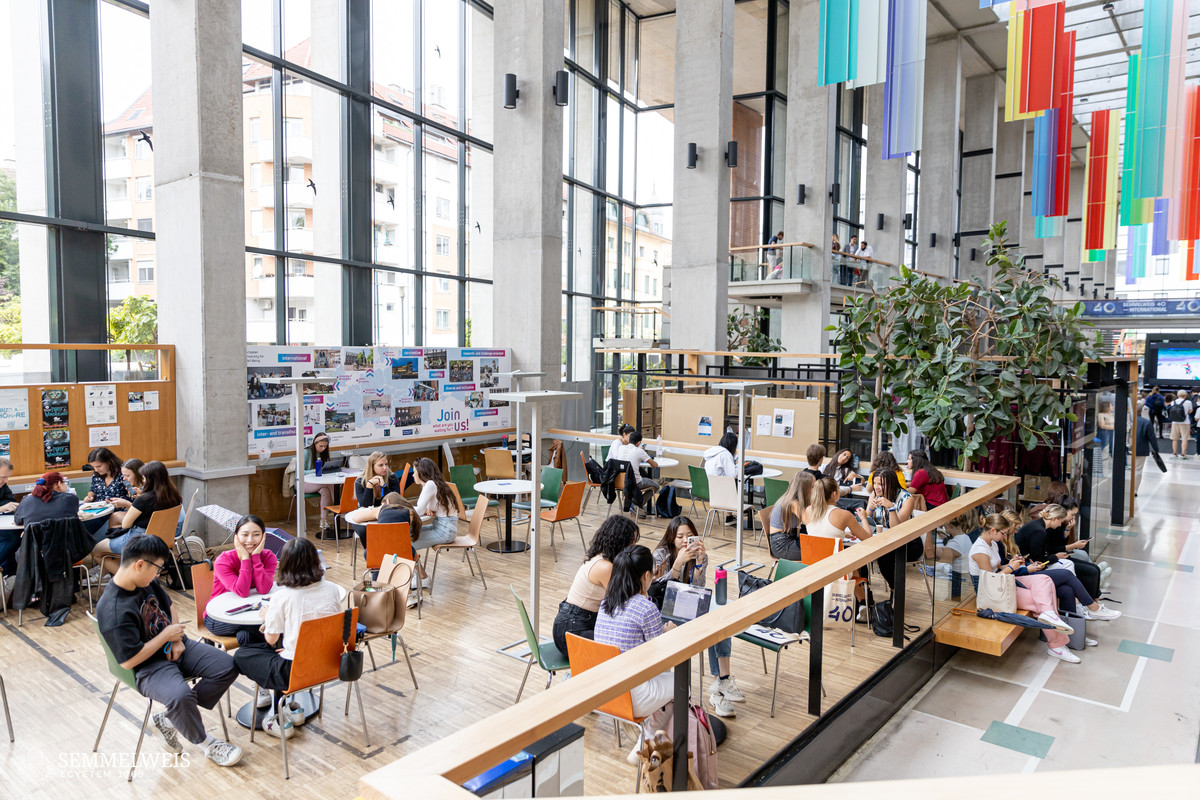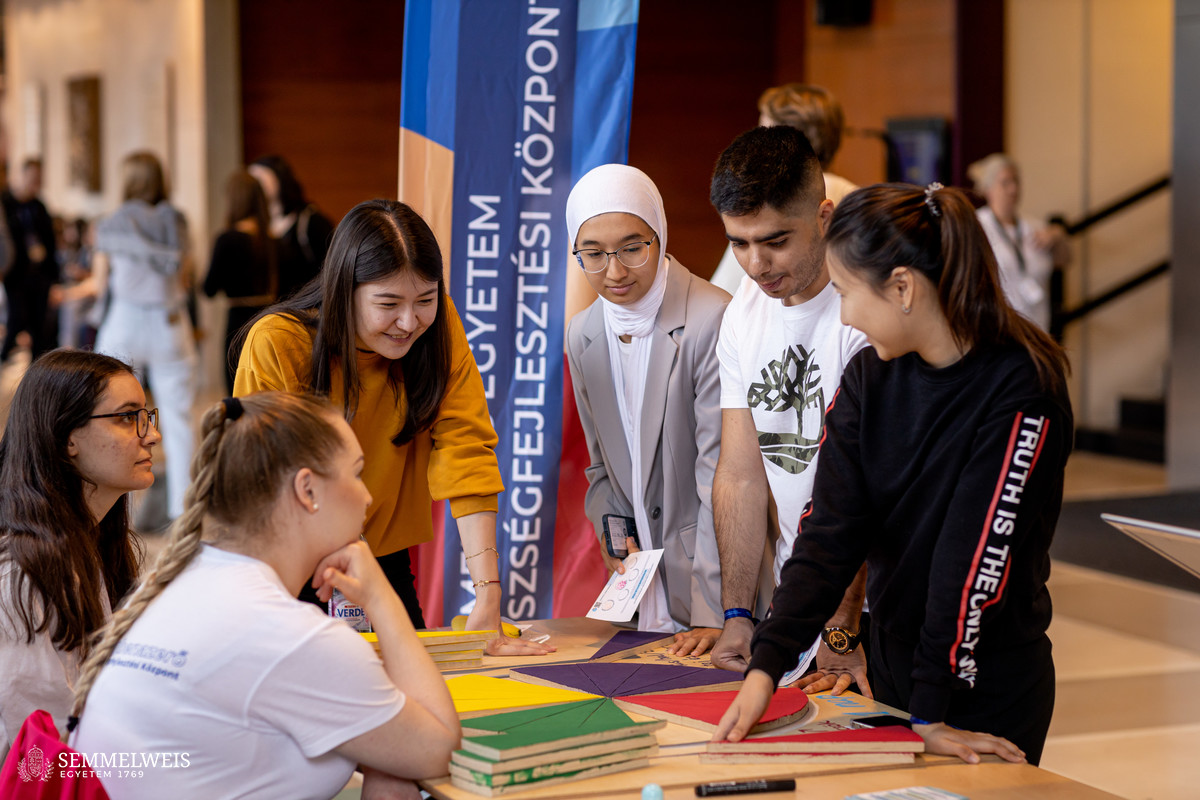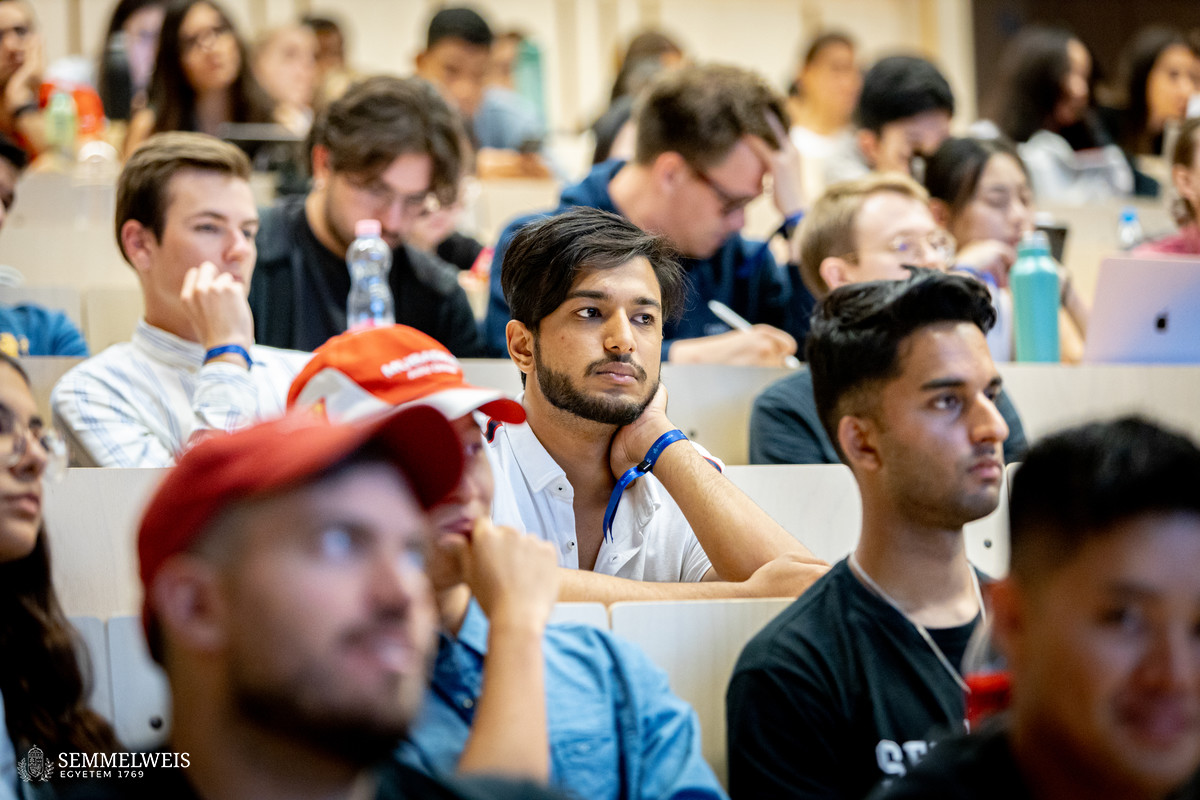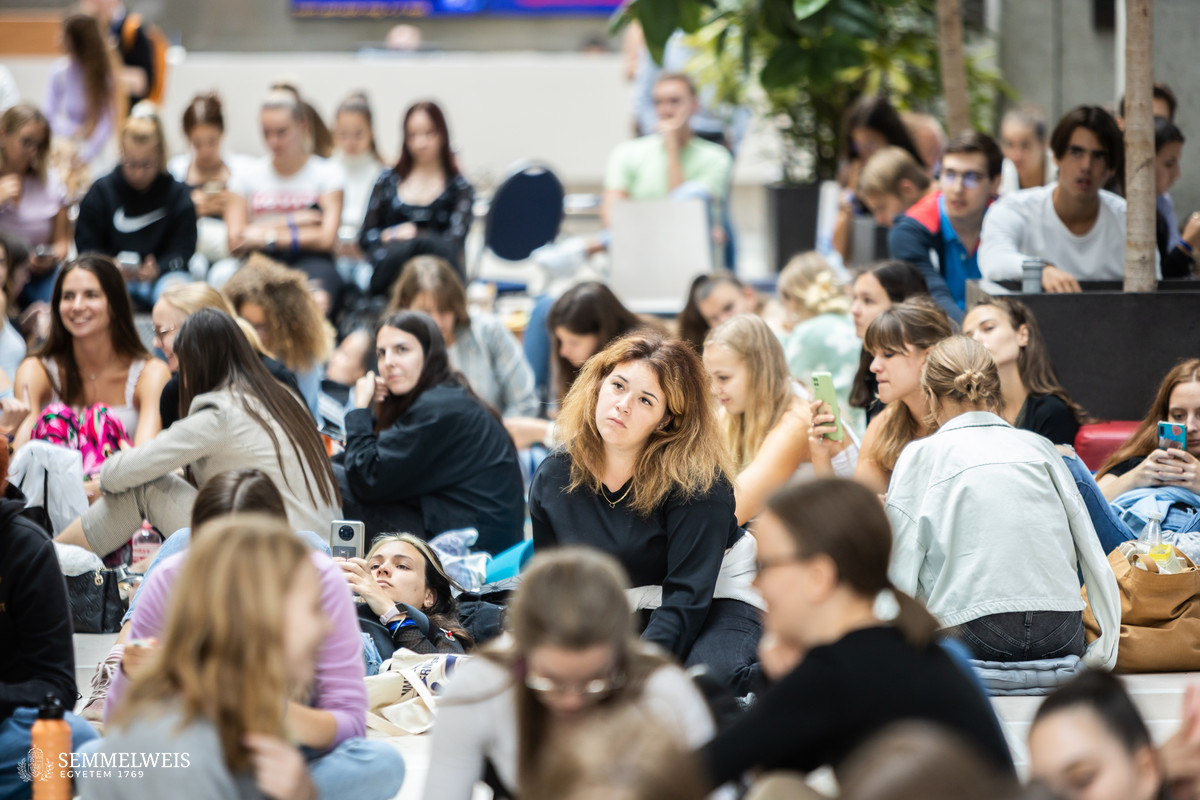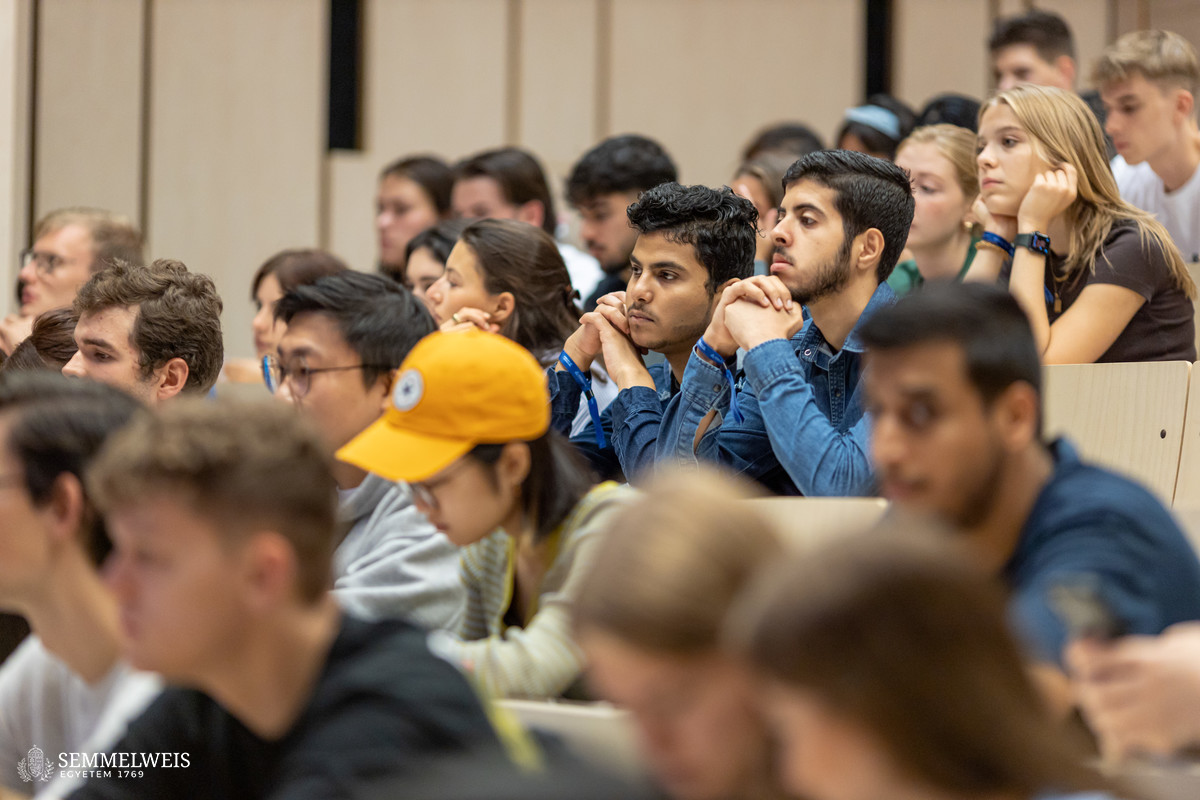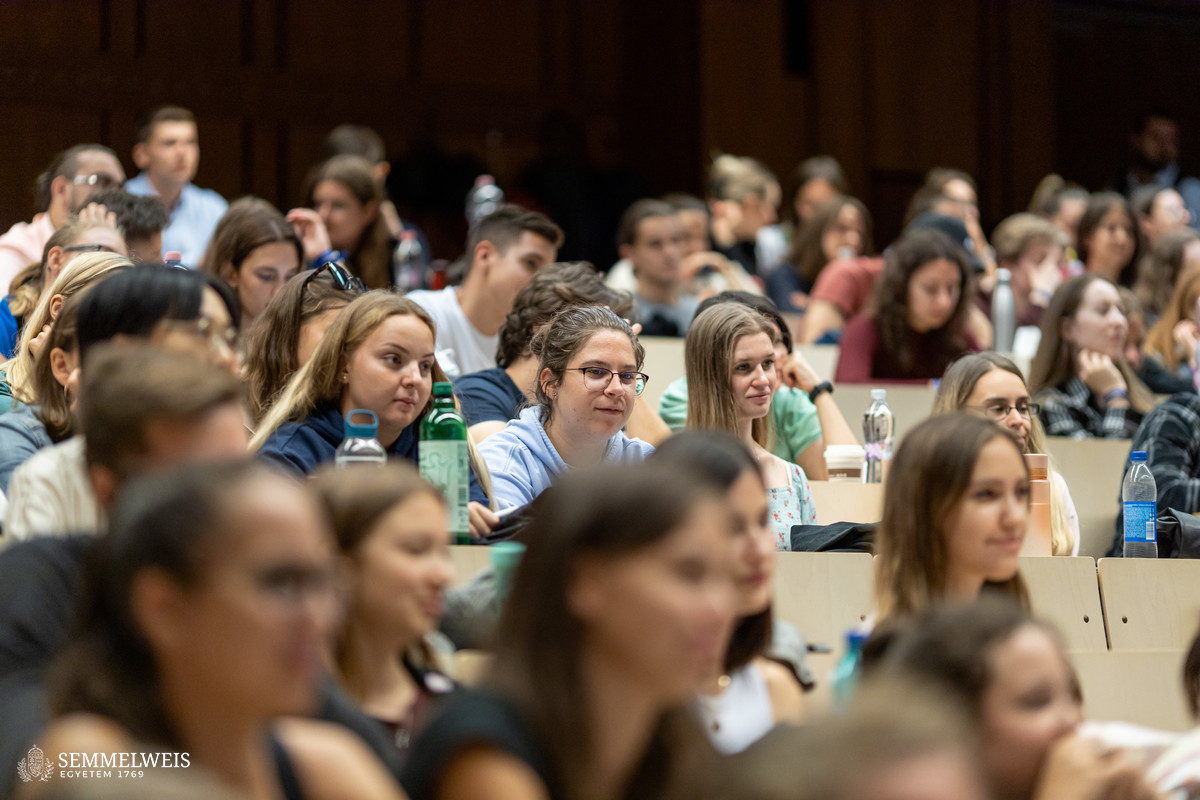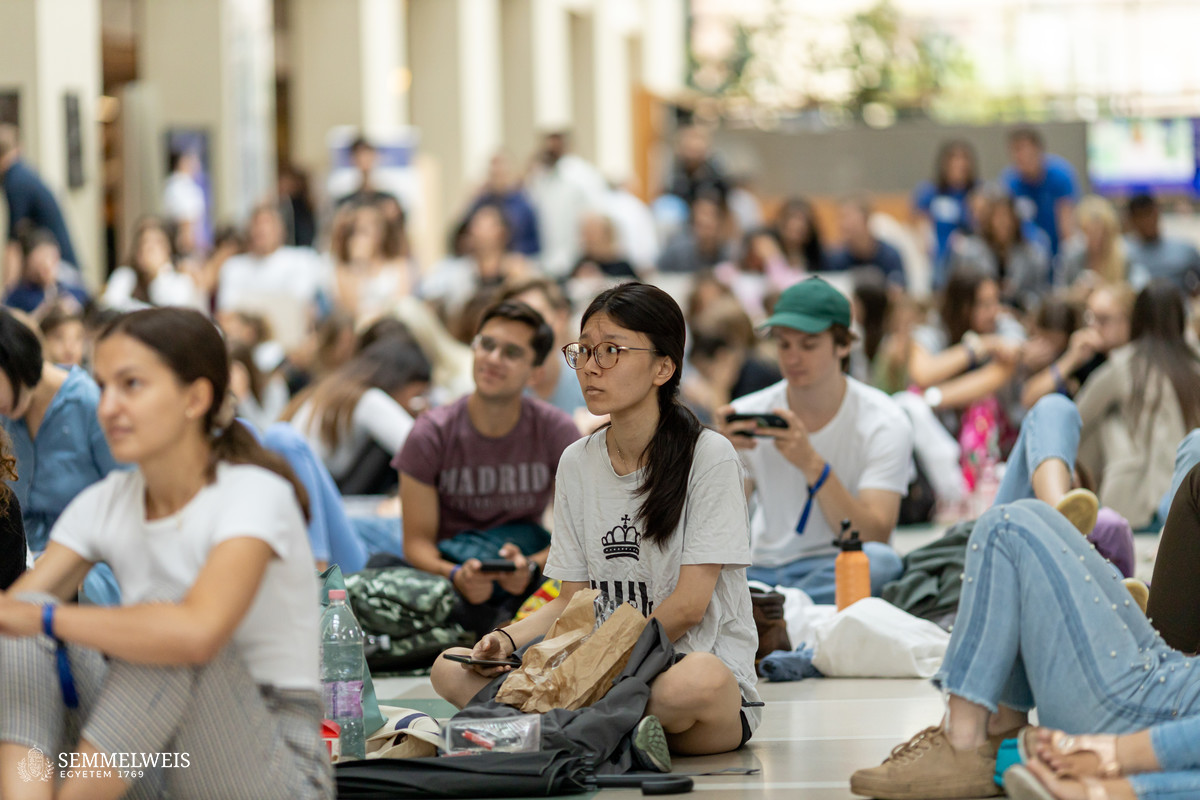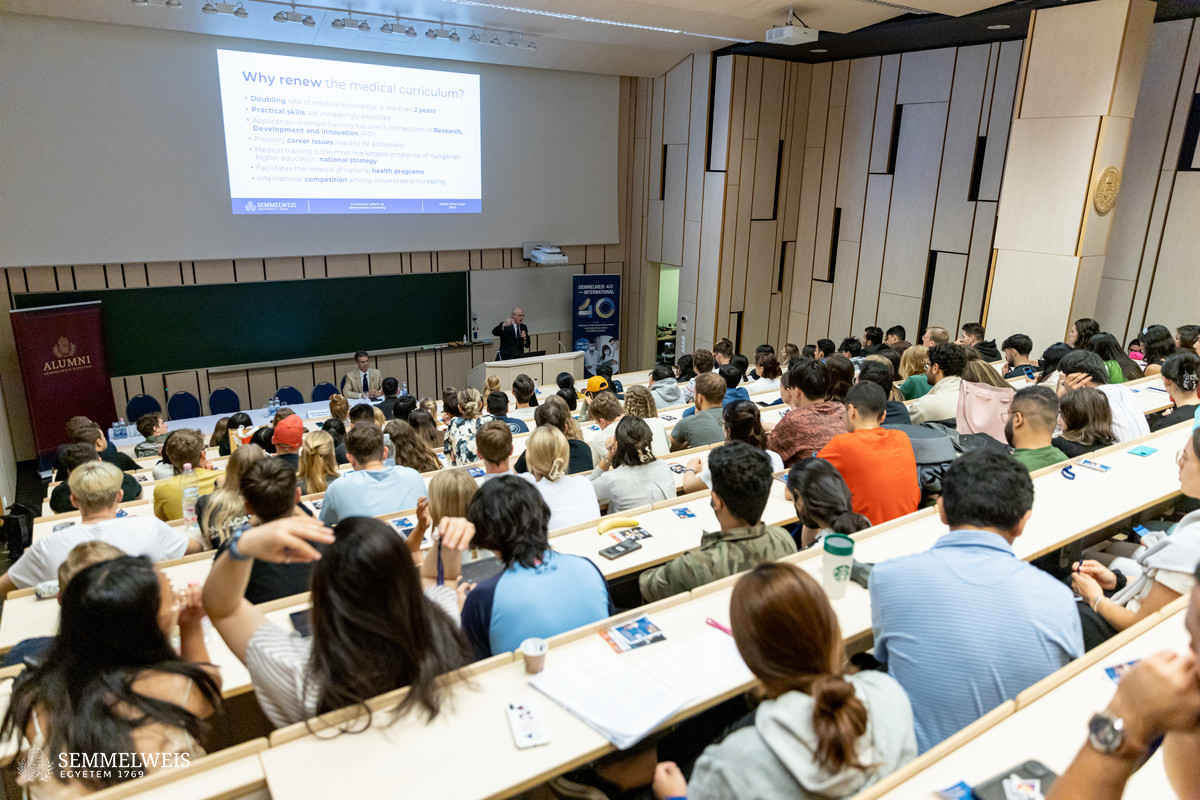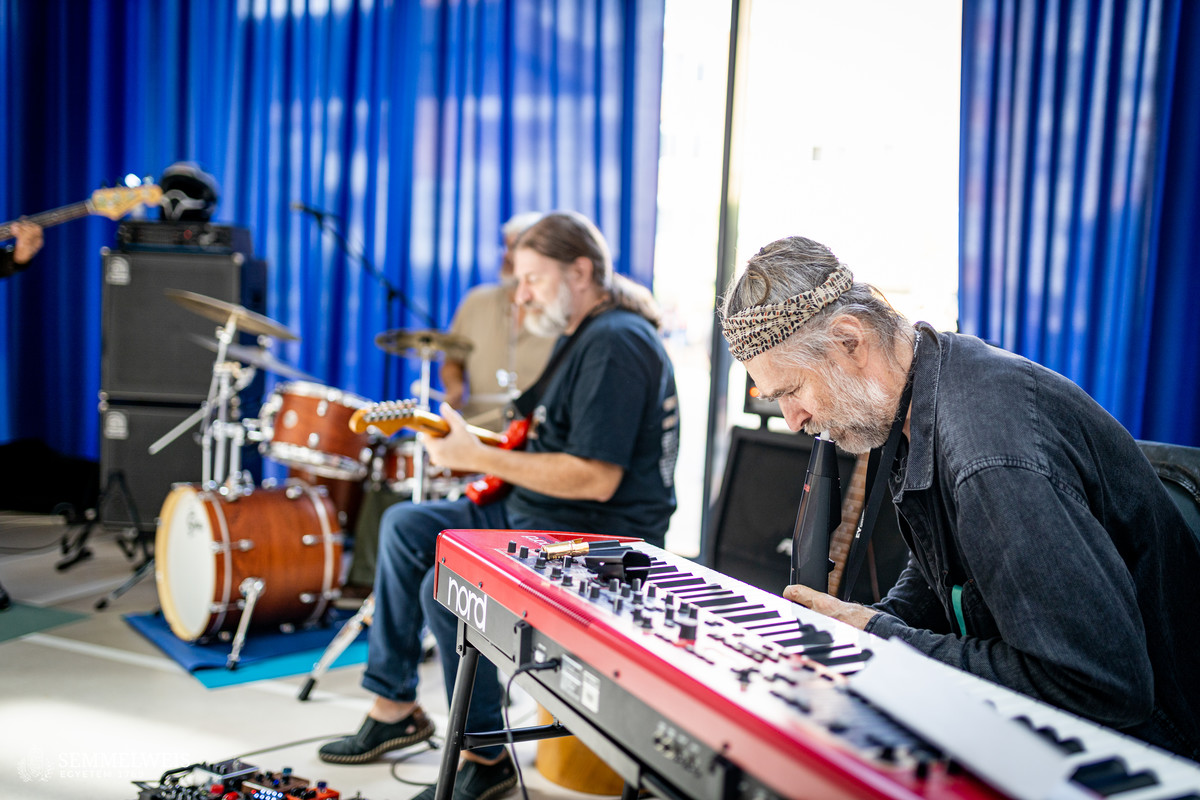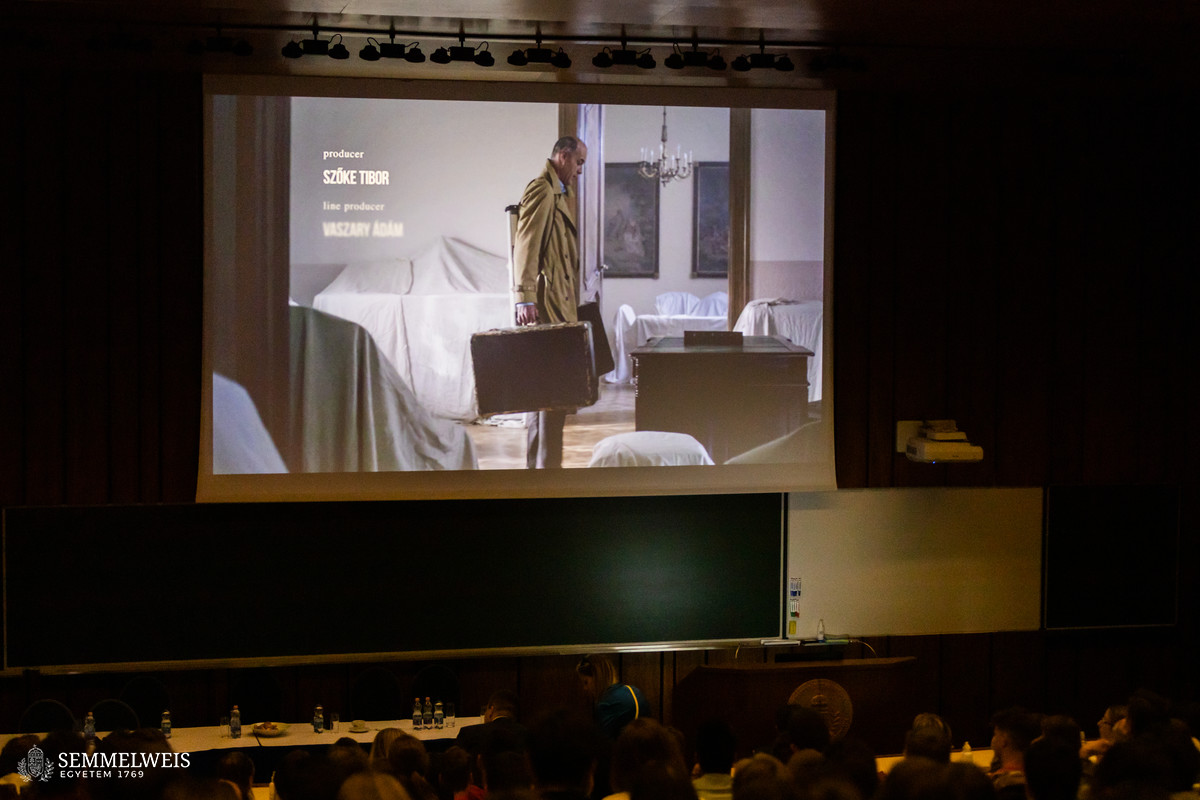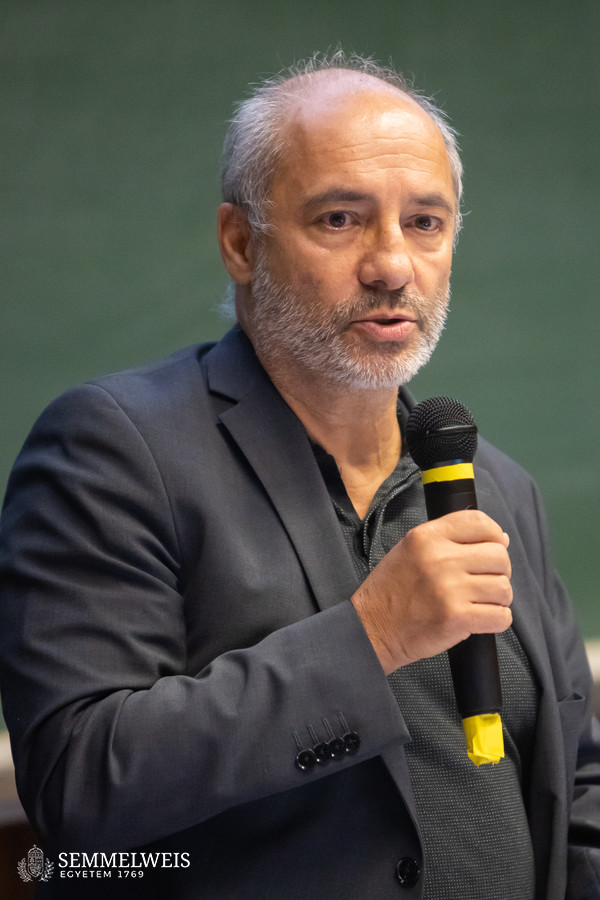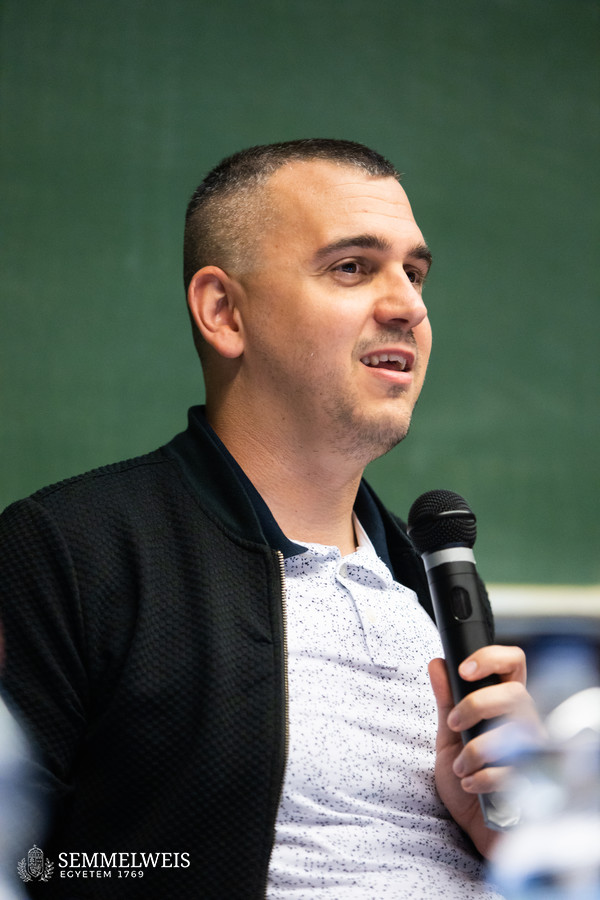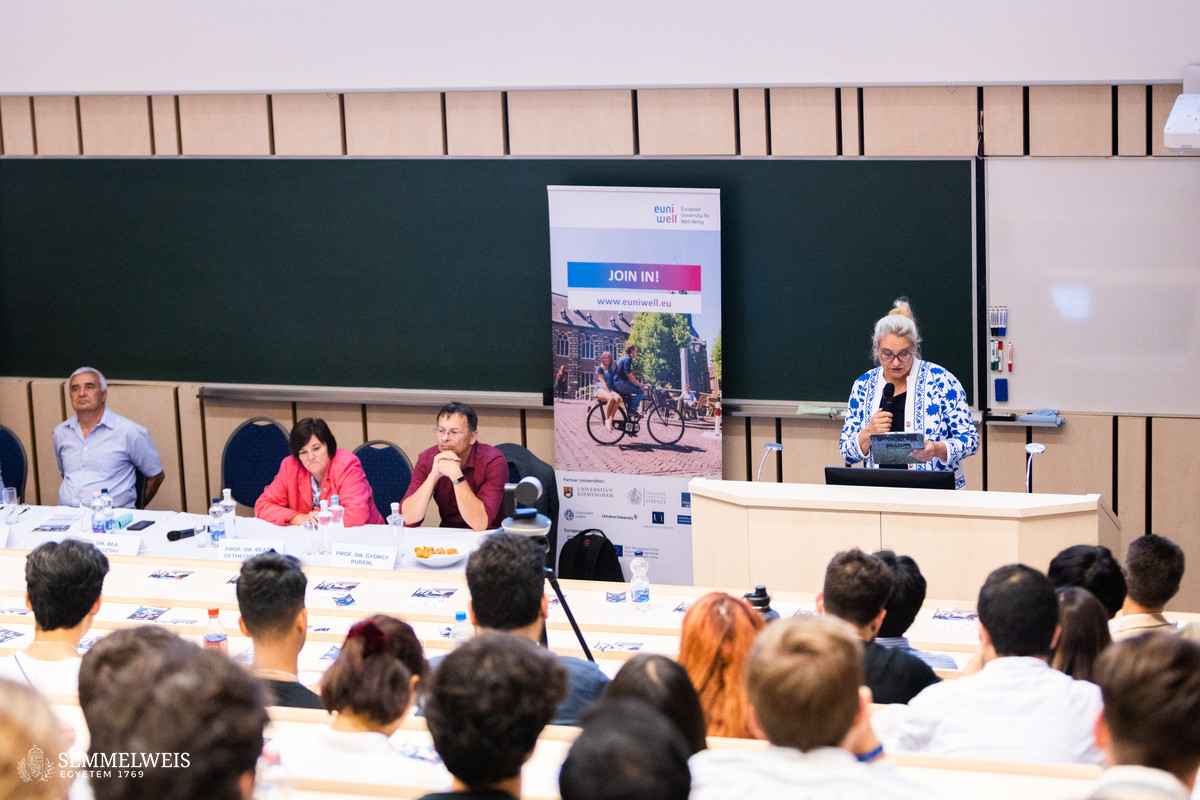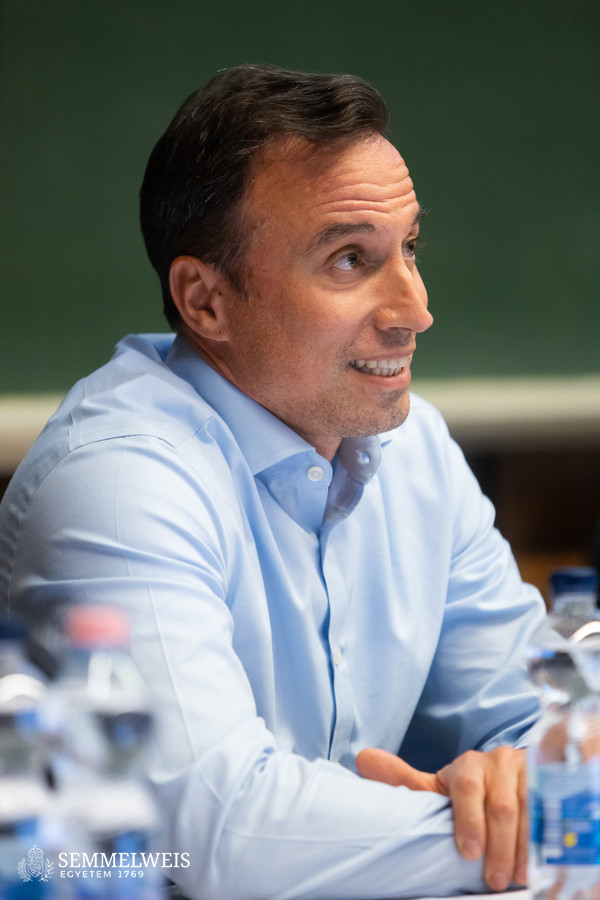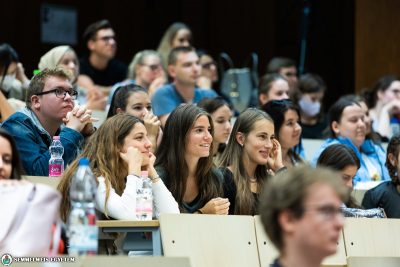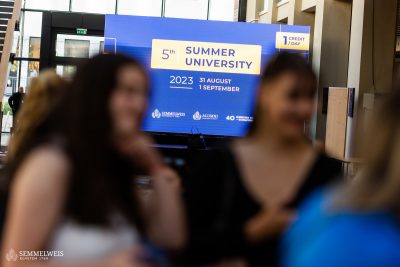All Hungarian and international students were welcome to attend the event free of charge and can earn one credit per day, provided that they register for the course in Neptun and verify their presence via the QR-code system during the event.
On the first day, after the welcome speech by Rector Dr. Béla Merkely, a roundtable discussion, “Have a coffee with the Semmelweis University leadership” took place, where leaders of the institution (Rector Dr. Béla Merkely; Dr. Gábor Orbán, CEO at Richter Group and Chairman of the Foundation for National Health Care and Medical Education which maintains the university; Dr. Lívia Pavlik, Vice-Chancellor; Dr. Péter Hermann, Vice-Rector for Educational Affairs; Dr. Alán Alpár, Vice-Rector for International Studies) traditionally discussed the developments, the infrastructure investments, the main research and educational trends affecting the university. Students were informed from the highest level of government on the health and higher education issues that concern them most, with the presence of Dr. Péter Takács, State Secretary for Health, and Dr. Balázs Hankó, Deputy State Secretary for Higher Education.
The English-language international program has been put together by the International Student Training Centre (ISTC) in close cooperation with the Directorate of International Relations, in consultation with the Alumni Board and the student organizations of English and German language courses, under the leadership of Dr. Alán Alpár, Vice Rector for International Studies.
Opening the international section, Rector Dr. Béla Merkely welcomed the international students of the institution.
Semmelweis University has all the qualities – competitive knowledge, an innovative approach worthy of its namesake, dedicated and highly qualified professionals, outstanding quality of education, scientific and clinical achievements – to become one of the world’s top 100 universities,”
Dr. Béla Merkely, Rector emphasized. In his keynote speech entitled “The secret behind the success of Semmelweis University,” he pointed out that the institution is a teaching, research and treatment center that is recognized not only regionally but also globally; it is ranked in the top 300 out of 28,000 universities in the world by Times Higher Education.
Among the criteria for success the rector cited a vision based on tradition, dynamic adaptation to the environment, active participation in science and professional policy making, supporting research, conscious brand building, continuous development of national and international relations, and personal example.
Speaking about education, he recalled that a major curricular reform has been introduced in 2019, balancing the ratio between theoretical and practical training. “The aim is to train Europe’s best doctors, dentists, pharmacists, conductors and health care managers,” he added. Dr. Béla Merkely recalled that in the last 40 years the university has become one of Europe’s leading English and German-language training institutions and is among one of the first European higher education institutions to set up international campus programs abroad (in Hamburg, Lugano and Bratislava).
Regarding research, the rector reminded that the university is a member of numerous international networks with more than 300 research groups. He stressed the importance of active involvement in the areas of academic life where new results, new processes and patents are developed, both in Hungary and abroad. “The research performance of Semmelweis University will be significantly increased in the field of translational research through patient-centered industry collaborations with domestic and international partners,” he promised, adding that the university aims to be a strong member of the Hungarian Innovation Ecosystem which will support the establishment of small but focused businesses based on university knowledge and know-how. Innovations are constantly being incorporated into patient care, the university is at the forefront of introducing state-of-the art technologies, such as the Da Vinci Xi, the latest surgical robot, he pointed out.
Semmelweis University treats 2.5 million medical cases a year. As Hungary’s largest medical institution, the university also played a lion’s share in the fight against the COVID epidemic, administering more than 550,000 coronavirus vaccines and performing over 800,000 PCR tests, approximately 10% of all tests performed in Hungary. “The university citizens have made a heroic and sacrificial contribution to the containment of the pandemic,” Dr. Béla Merkely said.
Dr. Alán Alpár, Vice-Rector for International Studies, held a lecture entitled “40 years of Excellence in International Education.”
Semmelweis University is an institution that is more than 250 years old, which also means 250 years of experience”,
he stressed, recalling that in 1769, the medical education did not start as an independent university, but as the Faculty of Medicine of the University of Nagyszombat. He also recalled his personal impressions when visiting to the centuries-old anatomical theatre in Bologna, which, he said, “fascinated him with its incomparable atmosphere and which every Semmelweis student should see once in life.
He mentioned the triad of tradition, reliability and development as vital pillars, saying that the secret lies in the combination of the classic, good old staffs with the new, the high-tech. “Only a researcher can be a good teacher,” he added.
In his passionate and inspiring presentation, Dr. Alán Alpár stressed the importance and uniqueness of practice-oriented teaching at the university. As he said, the fact that students do not just listen to lectures, but their knowledge and skills are constantly tested during their university years, that they are active participants in what happens during their hospital practice, is what makes this university’s education unique. In connection to research (TDK) work he also emphasized that students have to do scientific research from their heart, with joy, and not for papers or awards. He pointed out that the number of international students has practically doubled since 2006.
He highlighted the work of the International Semmelweis Student Association (ISSA) and the Deutschsprachige Studentenvertretung Semmelweis (DSVS), the organisations representing the interests of foreign students, and also spoke about the jubilee professional program series celebrating the four decades of international training.
He emphasized that participation in these programs is not only useful for earning credits, but also gives students a better insight into how Semmelweis University works and what kind of opportunities they have during their studies.
Dr. Miklós Kellermayer, Dean of the Faculty of Medicine, held a lecture on “Present and Future of Medical Education,” in which he emphasized that medical knowledge is “refreshing” in less than two years, practically doubling.
Speaking about the need to renew the curriculum, he stressed that practical skills are increasingly expected. The dean compared education to the way the market works, where “the customer dictates”. In this case, the needs of society must be taken into account, in terms of prevention, treatment and rehabilitation.
As he said, a general medical doctor is expected to think independently and critically, to be able to make certain basic medical decisions, to know and perform the first 15 minutes of emergency care, to be able to specialise as a “pluripotent stem cell” and to be a lifelong learner.
He also pointed out how international competition between universities has increased in recent times. As he said, medical education is the most marketable field of higher education in Hungary. Among the objectives he mentioned the strengthening of practical clinical training (small block-based training), the development of a hierarchy of interrelated subject groups, the elimination of curricular redundancies and the introduction of new subjects of importance for national health (transfusiology, rehabilitation, sports medicine).
Dr. Miklós Kellermayer said that student feedback is also important for the development of training, mentioning that a QR code allows participants to write their opinions on his lecture.
In the afternoon of the first day, one of the major discussions focused on mental health and well-being led by Dr. Bea Pászthy, Associate Professor at the Faculty of Medicine’s 1st Department of Pediatrics. According to her, every seventh young adult experiences some kind of mental health problem, and in 75 percent of the cases, it starts at the age of 20-24. „Therefore our task is to recognize the first symptoms, and offer proper help concerning the issue. In order to do so, however, it is very important to have discussions. You have to speak up for yourself, and ready to ask for help” stressed the professor.
After her introductory, Dr. György Purebl, Professor and Director at the Institute of Behavioural Sciences addressed the students. He gave a detailed account of the university’s mentoring program, where senior students help their younger peers with stress management, and also introduce them to community life. For those who are still struggling, the university provides counselling where they can get professional support. According to Dr. János Kollár, Associate Professor, Clinical Psychologist, and Head of the English-language student counselling, they have helped hundreds of young adults so far, and those in need are able to get an appointment within one week, upon contact.
Dr. Beáta Pethesné Dávid, Professor and Director at the Faculty of Health and Public Administration’s Institute of Mental Health continued his chain of thoughts on social interactions highlighting the fact that after years of the COVID pandemic, we all need to relearn how to be integrated. „There is a lot to do in this department – ask, discuss, interact and learn from each other, since basically, this is the first step to prevent mental health issues,” she said.
The panel discussion ended with a brief talk by Dr. Bence Stubnya, a representative of the Resident Doctors’ Association, and Moein Moeinzadeh, President of the International Semmelweis Student Association (ISSA). Dr. Bence Stubnya reminded that a lot of hard work is awaiting the freshmen, and that learning how to learn, being part of the community, and not to be afraid to ask for help is an important part of the process. Moein Moeinzadeh highlighted that the ISSA has associations for almost every nation; online support groups that started during the pandemic are resuming this year, and there is a group mentorship program run by ISSA as well.
The International Summer University also offered a range of programs related to public life, culture and sport. Invited guests were László Cseh former swimming champion, Csaba Sós, head coach of the Hungarian national swimming team, Bianka Papp, Paralympic champion, Judit Polgár, chess grandmaster and Feró Nagy, Kossuth Prize-winning performer. The film about the life of Gedeon Richter was screened in the film club, and actor Péter Rudolf, who plays the leading role, also took part in the round table discussion after the screening.
During the 1st day, students could listen lectures from the field of history, art and culture and of Physical Health & Well-being (the latter was organised in the framework of EUniWell):
-
Semmelweis – from The Outcast to The International Scientific Ambassador of Hungary (by Prof. Dr. László Rosivall, Professor Emeritus, Head of International Nephrology Research and Training Center)
-
Patient Centric Care – From Korányi to every day practice (by Dr. Ágnes Haris, Scientific manager, Péterfy Hospital)
-
Metacommunication and the Art of Healing – Psychophysiology of the Doctor as Medicine (by Prof. Dr. Imre Lázár, professor, Károli Gáspár University of Reformed Church; Head of Medical Humanities Research Group,Semmelweis University, Institute of Behavioral Sciences)
-
Medicine, Science and Art – My experience (by Ákos Kormányos, psychologist and poet, PhD student)
-
The impact of sleep on health and well-being. The role of community practices in health promotion (by Prof. Dr. Péter Torzsa, University Professor, Head of Department, Department of Family Medicine, Faculty of Medicine, Semmelweis University)
-
The role of physical activity in health promotion (by Dr. Réka Vernes, General Practitioner, specialist of sports and lifestyle medicine, Head of a praxis serving as an accredited training spot for the Department of Family Medicine, Semmelweis University)
-
Key to survival: improving resilience in face of adversity (by Dr. Ajándék Eöry, Associate Professor, Head of Integrative Medicine Unit, Department of Family Medicine, Semmelweis University)
-
Innovative nicotine addiction (by Dr. Dorottya Árvai, Department of Public Health, Semmelweis University)
-
Mental health and well-being – Roundtable discussion (Chair: Dr. Bea Pászthy associate professor, 1st Department of Pediatrics, Semmelweis University, Prof. Dr. György Purebl, University Professor, Director, Institute of Behavioural Sciences, Semmelweis University, Prof. Dr. Beáta Pethesné Dávid, University Professor, Director, Institute of Mental Health, Faculty of Health and Public Administration, Semmelweis University, Dr. János Kollár, Associate Professor, Clinical Psychologist, Head of English-language psychological student counselling, Semmelweis University, Moein Moeinzadeh – Medical Student, President of ISSA, Semmelweis University, Dr. Bence Stubnya, Vice-President, responsible for Budapest region, Resident Doctors’ Association)
-
Instrumental improvisation exercises & medicine (by Prof. Dr. József Tímár, University Professor, Faculty of Medicine, Semmelweis University)
-
Film Club: I haven’t dissapeared – the Story of Gedeon Richter
On the 2nd day, the following lectures were held:
- Emergency Medicine (by Dr. Péter Vass, Chief Clinical Physician, Master Teacher, Department of Emergency Medicine, Faculty of Medicine, Semmelweis University)
- Oral cancer, the silent killer – let’s prevent it together! (by Dr. Károly Mensch, Assistant Professor, Department of Oral Diagnostics, Faculty of Dentistry, Semmelweis University)
- Implantology, international experiences (by Dr. Dániel Végh, Assistant Professor, Department of Dental Prosthodontics, Faculty of Dentistry, Semmelweis University)
- Modern Virology: Travel into the nano-world (by Prof. Dr. Miklós Kellermayer, University Professor, Dean, Faculty of Medicine; Director, Department of Biophysics and Radiation Biology, Semmelweis University)
- The basics of Conductive Pedagogy (by Ildikó Dr. Pásztorné Tass, Professor, Institute of Conductive Pedagogy, András Pető Faculty, Semmelweis University)
- New ways in outbreak management – wastewater monitoring (by Dr. Tamás Pándics, Associate Professor, Head of Department, Department of Public Health, Faculty of Health Sciences, Semmelweis University)
- Role of regular physical activity in the prevention of cardiovascular diseases (by Dr. Mária Szekeres, Associate Professor, Department of Morphology and Physiology, Faculty of Health Sciences, Semmelweis University)
- Role and new vistas of the clinical pharmacist (by Dr. András Langer, Head of Unit, University Pharmacy, Faculty of Pharmacy, Semmelweis University)
- Personalized Medicine (by Prof. Dr. Mária Judit Molnár, University Professor, Director, Institute of Genomic Medicine and Rare Disorders, Faculty of Medicine, Semmelweis University)
- SE3D: the 3D Center of Semmelweis University: 3D technology as synergie of patient care, education and research (by
Dr. Imre Barabás, Head of Unit, 3D Center, Heart and Vascular Center, Semmelweis Unversity) - Modern Cardiology: From 3D printing to Surgery (by Dr. István Hartyánszky, Associate Professor, Head of Cardiac Surgery Department, Heart and Vascular Center, Faculty of Medicine, Semmelweis University)
- Development of medicines in the 21st century – how can you enter into the world of unlimited innovations? (by Prof. Dr. Péter Ferdinandy, University Professor, Vice-Rector for Science and Innovation; Director, Institute of Pharmacology, Semmelweis University)
- Covid-19 in the post-vaccination area (by Prof. Dr. Veronika Müller, University Professor, Director, Department of Pulmonology, Faculty of Medicine, Semmelweis University)
- Sustainability in Health Care (by Gabriella Sódar, Head of Business Development and Acceleration, Blue Planet Climate Protection Foundation; Lecturer of Sustainability in Healthcare course at Semmelweis University, Faculty of Health and Public Administration)
- Challenges in space medicine (by Dr. Klaudia Vivien Nagy, Assistant Professor, Heart and Vascular Center, Faculty of Medicine, Semmelweis University)
- Robotic surgery (by Prof. Dr. Attila Szijártó, University Professor, Director, Department of Surgery, Transplantation and Gastroenterology, Faculty of Medicine, Semmelweis University)
- The role of science communication in the medical field (ZOOM) – EUniWell Open Lecture (by Dr. Imre Varjú, Semmelweis Alumni, Medical Doctor, Health & Science Communication Expert, Behavior Strategist, Columbia University, Mailman School of Public Health, New York; Semmelweis University)
- Kunstfehler (by Dr. András Lászik, Associate Professor, Department of Forensic and Insurance Medicine, Faculty of Medicine, Semmelweis University – in German language)
Rita Kónya, Viktória Kiss, Gábor Kiss
Photos: Attila Kovács, Bálint Barta – Semmelweis University
